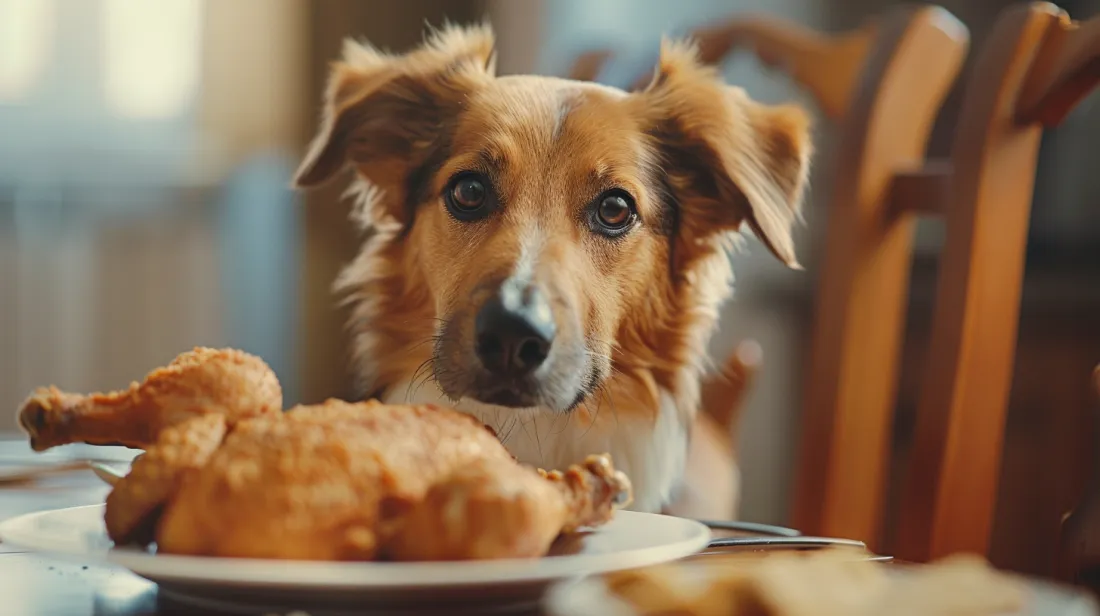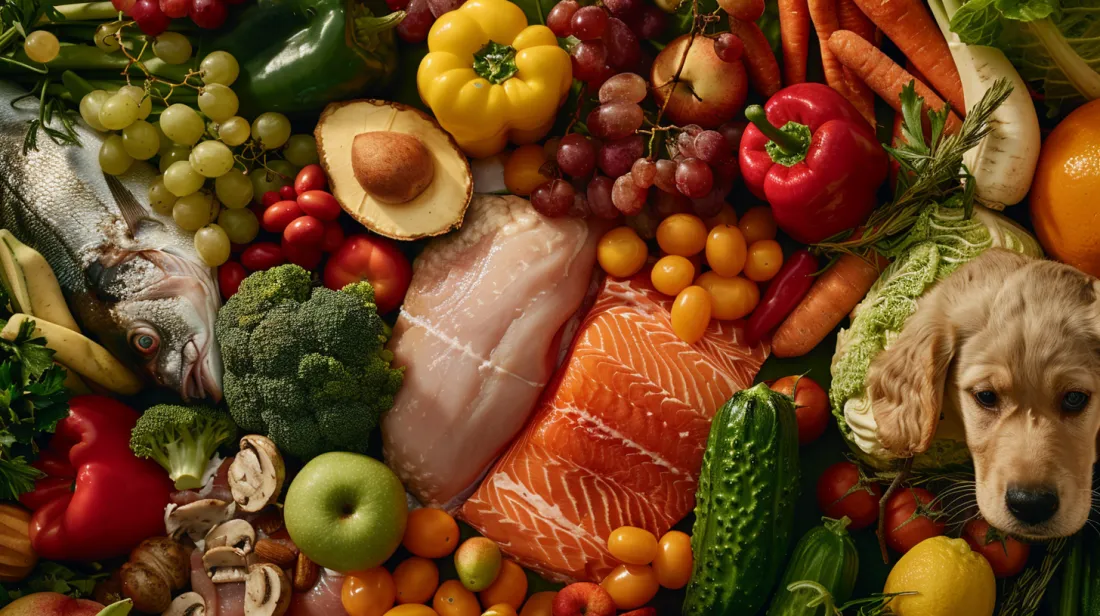So, you’re enjoying a crispy, golden piece of fried chicken, and your furry friend is giving you those eyes. You know, the ones that say, “Please, just one bite?” But can dogs eat fried chicken? The short answer is a resounding no. While it might seem harmless to share a tiny morsel, fried chicken can pose serious risks to your canine companion’s health.

Can Dogs Eat Fried Chicken? The Hidden Dangers
Pancreatitis
Fried chicken is loaded with fat, which can wreak havoc on a dog’s digestive system. One of the most concerning risks is pancreatitis, a painful inflammation of the pancreas. This vital organ produces enzymes that aid digestion and hormones that regulate blood sugar. When a dog eats fatty foods like fried chicken, it can trigger an excessive release of these enzymes, leading to inflammation and damage.
Symptoms of pancreatitis include vomiting, diarrhea, abdominal pain, lethargy, and loss of appetite. In severe cases, it can even be fatal. Recent studies have shown an alarming increase in pancreatitis cases in dogs, with fatty foods being a major culprit.

Obesity and Its Domino Effect
Fried chicken isn’t just bad for the pancreas; it’s a calorie bomb that can quickly pack on the pounds. Obesity in dogs, just like in humans, opens the door to a slew of health issues. It puts extra stress on joints, leading to arthritis and mobility problems. It increases the risk of diabetes, a chronic condition that requires lifelong management. And it can even shorten a dog’s lifespan. Research has shown that overweight dogs live an average of two years less than their leaner counterparts.
Gastrointestinal Upset
The grease and spices in fried chicken can irritate a dog’s sensitive stomach lining. This can lead to vomiting, diarrhea, and general discomfort. While an occasional upset stomach might seem minor, repeated episodes can weaken the digestive system and make your dog more susceptible to other health problems.
Choking Hazards and Toxic Ingredients
Fried chicken, especially bone-in pieces, presents a choking hazard for dogs. Small bones can easily splinter and become lodged in the throat or intestines, requiring emergency veterinary intervention.
Moreover, fried chicken is often seasoned with ingredients that are toxic to dogs. Garlic and onion powder, common seasonings in fried chicken recipes, can damage a dog’s red blood cells and lead to anemia. Even seemingly harmless herbs like nutmeg can be dangerous in large quantities, as noted in the ASPCA’s list of toxic and non-toxic plants for dogs.
Long-Term Damage: The Silent Threat
The consequences of feeding fried chicken to your dog aren’t always immediate. Repeated exposure to high-fat foods can contribute to chronic inflammation throughout the body. This low-grade inflammation has been linked to various health problems, including cancer, heart disease, and cognitive decline.

The Fried Chicken Myth: Debunking Common Misconceptions
There are several misconceptions about feeding fried chicken to dogs that need to be addressed:
A Little Bit Won’t Hurt
You might think that a small bite of fried chicken won’t harm your furry friend, but even small amounts can be problematic. The high fat content can still trigger digestive upset and contribute to long-term health problems. It’s like giving a child a small sip of soda – it might seem harmless, but it sets a bad precedent and can lead to unhealthy habits down the line.
My Dog Loves It!
Dogs are notorious for their love of food, and they’ll often gobble up anything you offer them. Just because your dog enjoys the taste of fried chicken doesn’t mean it’s good for them. Remember, dogs don’t understand the concept of healthy eating. It’s your responsibility as their owner to make wise choices on their behalf.
Homemade is Better
While homemade fried chicken might be healthier for humans than the fast-food variety, it’s still not a good choice for dogs. The cooking process involves using oil and fat, which are the main culprits behind pancreatitis and other health issues. Even if you use lean chicken and minimal seasoning, the fat content remains a concern.
Vet’s Insight: Dr. Sarah Johnson, a veterinarian with over 20 years of experience, says, “The ‘a little bit won’t hurt’ mentality is a dangerous one when it comes to feeding dogs fried chicken. It’s important to remember that dogs have different dietary needs than humans, and what might seem harmless to us can have serious consequences for them.”

Vet-Approved Alternatives to Fried Chicken
The good news is that there are plenty of healthy and delicious alternatives to fried chicken that your dog will love.
Plain Cooked Chicken
Plain, cooked chicken (without skin or bones) is an excellent source of lean protein for dogs. It’s easy to digest, gentle on the stomach, and can be prepared in various ways to keep your dog interested. You can boil, bake, or grill it, and even add it to their regular kibble for an extra protein boost.
Other Safe Protein Sources
Don’t limit your dog to just chicken! There are many other dog-friendly protein sources that you can incorporate into their diet:
- Turkey: Lean ground turkey or small pieces of cooked turkey breast are a great option.
- Fish: Salmon, tuna, and whitefish are rich in omega-3 fatty acids, which are beneficial for skin and coat health. Make sure to remove all bones before feeding.
- Eggs: Scrambled or hard-boiled eggs are a good source of protein and vitamins.
- Lean Beef: Small amounts of cooked lean beef can be offered occasionally.
Fruits and Vegetables
Fruits and vegetables are packed with essential vitamins, minerals, and fiber that contribute to a dog’s overall health. Some safe and nutritious options include:
| Fruit/Vegetable | Benefits |
| Blueberries |
Rich in antioxidants, which help protect cells from damage
|
| Carrots |
Good source of beta-carotene, which is important for eye health
|
| Broccoli |
Contains vitamins, minerals, and fiber
|
| Green beans |
Low in calories and high in fiber, good for weight management
|
| Apples |
Provide vitamins A and C, as well as fiber (remove seeds and core)
|
Homemade Dog Food Recipes
If you’re feeling adventurous, you can even try making your own dog food at home. There are numerous recipes available online that are vet-approved and balanced to meet your dog’s nutritional needs. This allows you to control the ingredients and tailor the recipe to your dog’s preferences and dietary restrictions.

What to Do If Your Dog Eats Fried Chicken
It’s a scenario every dog owner dreads: You turn your back for a moment, and your furry friend has snatched a piece of fried chicken off your plate. Here’s what you need to do:
Don’t Panic
First and foremost, don’t panic. A small bite of fried chicken is unlikely to cause immediate, life-threatening harm. However, it’s crucial to monitor your dog closely for any signs of illness.
Assess the Situation
How much fried chicken did your dog eat? Was it a small nibble or a whole piece? Did it contain bones? The amount and type of fried chicken consumed will dictate your next steps.
If Your Dog Ate a Small Amount:
- Monitor for Symptoms: Keep a close eye on your dog for the next 24-48 hours. Look for signs of vomiting, diarrhea, lethargy, abdominal pain, or loss of appetite.
- Contact Your Vet: If your dog shows any of these symptoms, or if you have any concerns, contact your veterinarian immediately. They may recommend bringing your dog in for a checkup or providing supportive care at home.
If Your Dog Ate a Large Amount or Bones:
- Contact Your Vet Immediately: Don’t wait for symptoms to appear. A large amount of fried chicken or the presence of bones can be a serious medical emergency.
- Follow Your Vet’s Instructions: Your veterinarian may advise you to induce vomiting or bring your dog in for treatment. Follow their instructions carefully.

First Aid Measures
In some cases, your veterinarian may recommend inducing vomiting at home if it’s safe and appropriate for your dog. This should only be done under the guidance of a veterinarian, as there are certain situations where inducing vomiting can be harmful.
Conclusion
As tempting as it might be to share your fried chicken with your furry friend, it’s crucial to resist those pleading eyes. Fried chicken poses significant risks to your dog’s health, ranging from immediate digestive upset to long-term, potentially life-threatening conditions.
By opting for healthier alternatives like plain cooked chicken, other lean proteins, fruits, vegetables, and vet-approved treats, you can ensure your dog enjoys a delicious and nutritious diet that supports their overall well-being. Remember, a few moments of pleasure for your dog aren’t worth risking their health.

FAQs
Can a small amount of fried chicken really harm my dog?
Yes, even a small amount can trigger digestive upset and contribute to long-term health issues like pancreatitis and obesity.
What are the signs my dog has pancreatitis after eating fried chicken?
Look for vomiting, diarrhea, lethargy, abdominal pain, loss of appetite, and increased thirst or urination. If you notice any of these, contact your vet immediately.
Are there any long-term effects if my dog has eaten fried chicken multiple times?
Repeated exposure to fried chicken can lead to chronic inflammation, increasing the risk of pancreatitis, diabetes, heart disease, and even certain types of cancer.
My dog ate fried chicken bones – what should I do?
Fried chicken bones are extremely dangerous as they can splinter and cause choking or internal injuries. Contact your veterinarian immediately for advice.
Can I give my dog the leftover fried chicken grease or oil?
Absolutely not! The grease and oil are the most dangerous parts of fried chicken for dogs. They are highly concentrated in fat and can easily trigger pancreatitis.
Are there certain dog breeds more susceptible to the negative effects of fried chicken?
Smaller breeds and those with a history of pancreatitis are particularly vulnerable due to their smaller size and sensitive digestive systems.
Is it safe to feed my puppy fried chicken?
No, puppies are even more sensitive than adult dogs. Fried chicken can severely disrupt their developing digestive systems and lead to long-term health problems.
What are some healthy and tasty alternatives to fried chicken that I can give my dog?
Plain cooked chicken, turkey, fish, eggs, and certain fruits and vegetables are excellent alternatives. You can also find many healthy, commercially available dog treats.

Healthy dogs mean happy dogs, and that makes me happy! I’m here to share all the tips for keeping your best furry friend in top shape, from puppyhood to their golden years.

